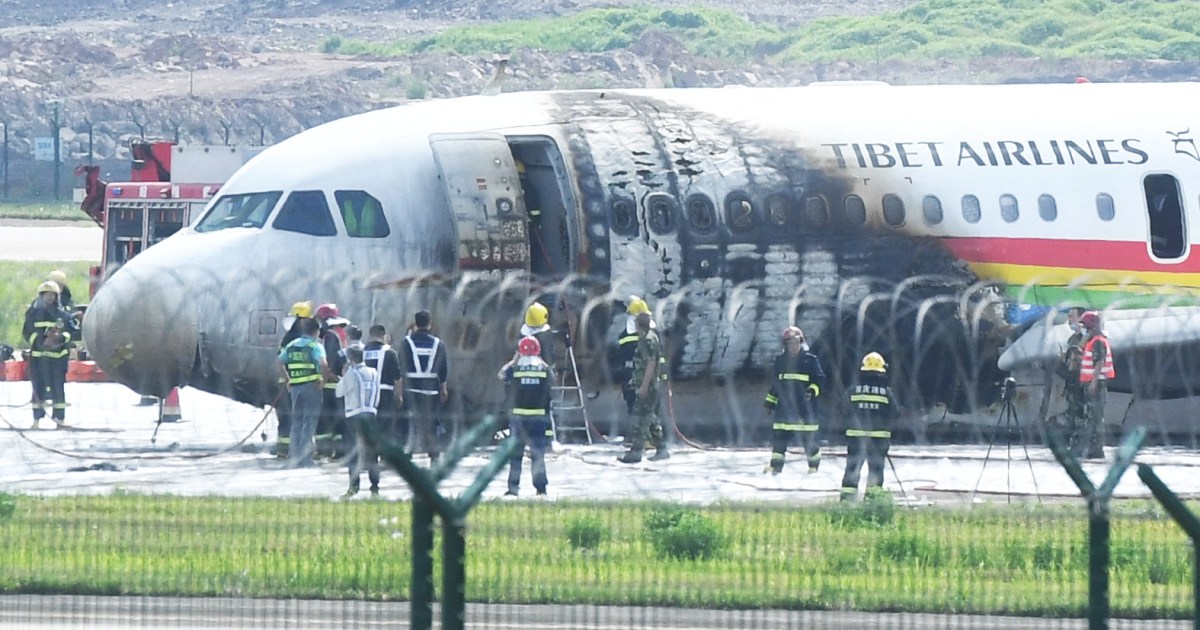‘Most vexing’ test: Can Pakistan’s Sharifs revive talks with India’s Modi?
Islamabad, Pakistan — It was a brief, formal exchange.
On March 5, two days after Shehbaz Sharif became Pakistan’s 24th prime minister, his Indian counterpart posted a 13-word message on social media platform X. “Congratulations to @CMShehbaz on being sworn in as the Prime Minister of Pakistan,” the Indian premier wrote.
Sharif took two days to respond. “Thank you @narendramodi for felicitations on my election as the Prime Minister of Pakistan,” he wrote on March 7.
Modi’s congratulatory message and Sharif’s response set off questions, even in a US State Department briefing, about the prospect of a detente between the nuclear-armed subcontinental neighbours that have barely functional diplomatic relations. The State Department weighed in, saying it hoped for a “productive and peaceful relationship” between New Delhi and Islamabad.
But even though the Pakistani prime minister’s elder brother Nawaz Sharif has a long history of seeking breakthroughs with India – including with Modi – analysts on both sides of the border say that the direction of ties can only be gauged after India’s upcoming national elections, scheduled to take place in April and May.
Maleeha Lodhi, a retired Pakistani diplomat who has served as ambassador to the United Nations, United States as well as the United Kingdom, said that managing relations with New Delhi will prove the “most vexing” foreign policy test for the current government.
“It’s true that previous PMLN were amenable to engage with India but it used to be reciprocal,” she told Al Jazeera, referring to the Pakistan Muslim League Nawaz (PMLN), the party of the Sharif brothers. “But today there are many obstacles to normalising ties which are not easy to overcome.
“With India going to the polls this year, any significant engagement will have to wait till after the elections.”
Kashmir conundrum
Arguably, the biggest obstacle to any movement towards normalcy between the neighbours remains the question of the Kashmir valley, the picturesque, but contentious Himalayan region over which they have fought multiple wars since gaining independence from British rule in 1947. The region is claimed in full by both, but each only governs parts of it.
New Delhi has accused Islamabad of backing Kashmiri armed rebels fighting either for independence or for a merger with Pakistan. Islamabad has denied the allegations, saying it only provides diplomatic support to the region’s struggle for the right to self-determination.
Relations between India and Pakistan further worsened in 2019 when Modi’s Hindu nationalist government revoked Article 370 of the Indian Constitution, which used to give Indian-administered Jammu and Kashmir partial autonomy.
Kashmir is at the heart of the differences between India and Pakistan, and is a subject in which each of the neighbours has set conditions for talks that are unacceptable to the other. India insists that the status of Jammu and Kashmir is an internal matter for the country. Pakistani leaders, on the other hand – including the Sharif brothers – have linked progress in ties with India to a reversal of the 2019 decision by New Delhi.
Former Indian high commissioner to Pakistan, Sharat Sabharwal said that if the aim is to improve relations, the ball is in Pakistan’s court, adding that it was Pakistan that suspended trade as well as downgraded diplomatic representation.
“Since then, it has made engagement with India contingent upon India reversing its move to end the special status of Jammu and Kashmir under the Indian Constitution. This is just not going to happen,” he told Al Jazeera. “It is for the Pakistan government to take a more pragmatic and constructive view if things are to move forward.”
The Sharif touch
Yet, despite the tough posturing on both sides, some analysts are cautiously optimistic about the possibility of a renewed attempt by the two governments to improve ties, in large part because of the history that the Sharifs share with Modi and his Bharatiya Janata Party.
In February 1999, the then-Indian Prime Minister from the BJP, Atal Bihari Vajpayee, took a bus ride across the border to Lahore to meet Nawaz Sharif, who was then in his second stint as prime minister.
Nawaz and Vajpayee signed a treaty that was seen as an historic confidence-building breakthrough between the two countries, less than a year after both of them conducted nuclear tests that had escalated tensions in the region.
However, three months after the treaty, the two countries engaged in a war in Kargil in Indian-administered Kashmir. India accused Pakistani soldiers of infiltrating into territory it controlled. Nawaz blamed his then-military chief, General Pervez Musharraf and other top commanders for orchestrating the incursion behind his back.
Only a few months later, Musharraf carried out a military coup in October 1999 in which Sharif was removed from power, just two years after assuming charge as the prime minister.
A year after Nawaz finally returned to power in 2013, the BJP, too, came back into office after a decade in opposition – this time with Modi as prime minister. Nawaz joined leaders from across South Asia in travelling to New Delhi for Modi’s oath-taking ceremony.
![Nawaz Sharif became the first Pakistani premier to visit India to attend a prime minister's oath-taking in 2014. [Harish Tyagi/EPA]](https://www.aljazeera.com/wp-content/uploads/2024/03/NS-Modi-Harish-Tyagi-1709875940.jpg?w=770&resize=770%2C560)
Then, on Christmas day in December 2015, Modi stunned both nations with a surprise visit to Lahore to attend the wedding of Nawaz’s granddaughter. The Pakistani government said that the two nations would restart a formal dialogue and announced a meeting of senior diplomats in January 2016.
But merely a week later, four attackers targeted an Indian Air Force base which resulted in the deaths of at least eight Indians, including security personnel.
India once again blamed Pakistan for the incident and demanded it arrest the perpetrators behind the attack. In September 2016, after armed fighters attacked an Indian Army outpost in Kashmir, Indian soldiers crossed over into Pakistani-administered territory to raid what New Delhi described as “militant launch pads”.
Three years later, in February 2019, just before India’s last national elections, tensions soared again, after 46 Indian paramilitary soldiers were killed in a suicide bombing in Indian-administered Kashmir. The Indian Air Force responded with a strike inside Pakistani territory, saying it targeted fighters’ training camps.
Pakistani jets in turn entered Indian airspace the next day. An Indian Air Force jet that chased Pakistani planes was shot down, its pilot captured. The standoff calmed down after Pakistan returned the pilot, Abhinandan Varthaman, two days after his arrest.
This complex history of steps towards talks that have often unravelled before any meaningful progress is made is evidence, to many observers – and Indian diplomats in particular – of the influence of the Pakistani military in the relationship between the two countries. Some Indian analysts have accused the Pakistani army of sabotaging past peace initiatives.
But to others, the February 2019 skirmish underlined how Pakistan figures in Indian election calculations. Modi’s popularity benefitted from the episode, which his party framed as a demonstration of strength against Pakistan. The BJP returned to power in May that year with an even bigger mandate than in 2014.
Signs of a shift?
Despite a formal diplomatic chill, the two countries found some common ground in February 2021, when they renewed a two-decade-old ceasefire pact along the 725km (450 miles) Line of Control, the de facto border that divides Kashmir between the two nations.
Then, in 2022, when Shehbaz Sharif became the prime minister for the first time after the removal of Imran Khan and his Pakistan Tehreek-e-Insaf (PTI) through a parliamentary vote of no confidence, Modi congratulated him and said he wished to work together to bring “peace and stability” to the region.
Radha Kumar, a New Delhi-based foreign policy expert, spots a shift in the Pakistani military’s approach to India, too.
“I would say that there does appear to have been some change in the Pakistan army’s thinking insofar as hostilities have been relatively contained during the past few years. But we do not know how far the containment has been due to heavy security on the Indian side,” she told Al Jazeera.
Yet, considering the political instability in Pakistan and the country’s continuing economic crisis, other analysts say that Shehbaz and his government – which only came to power after cobbling together an alliance with traditional political rivals – have little manoeuvring room.
Islamabad-based foreign policy expert and researcher Muhammad Faisal said that New Delhi has realised it can run its regional foreign policy more effectively while “ignoring” Pakistan. Meanwhile, the Pakistani government will need internal consensus before engaging with India.
“The government needs express support from its ruling partners as well as the military to explore any outreach to India. Rival parties, especially the opposition, will oppose any engagement with India – it is a test of PM Sharif’s political craft if he can build a political consensus,” he told Al Jazeera.
Kumar, who is also the author of Paradise at War: A Political History of Kashmir, acknowledged the political challenges. But, she said, leaders who take the gamble of attempting better ties might find popular support.
“Like India, Pakistan is in a state of high political polarisation. In Pakistan, opposition politicians will seize on anything that can be seen as ‘soft’ towards India, and in India BJP politicians will seize on any opposition ‘softness’ towards Pakistan,” she said. “So if the leaders in both countries want to engage in peacemaking, they will have to be resolute. I think they will both get support from sizable sections of the public.”
Vivek Katju, a former Indian diplomat, said Pakistan also needed to open up its trade borders with India to restore its economic health.
“Pakistan is at a critical point, something the new prime minister acknowledged in his speech. But it cannot transform itself unless it revises its approach and relationship with its neighbours, particularly India, and bring a fresh, objective mindset, viz a viz Jammu and Kashmir,” he told Al Jazeera.
However, Aizaz Chaudhry, who was Pakistan’s foreign secretary during Modi’s 2015 visit, said that any gesture from Pakistan was unlikely to be “reciprocated” by India at the moment.
“Indian leadership is pursuing the goal of Hindu nationalism and has followed a no-contact policy with Pakistan,” he told Al Jazeera. “The government should wait until Indians change their mind and show they want peaceful relations with Pakistan.”




